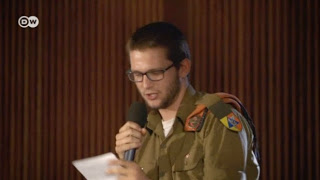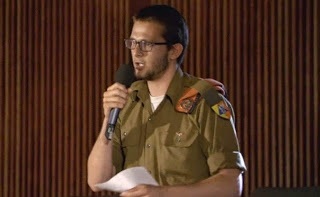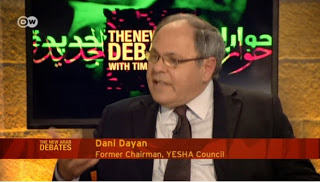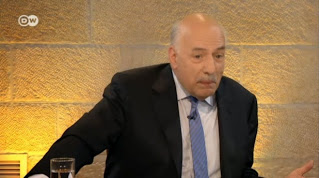They do nothing about the murder
of Palestinians but they deal swiftly with critics from within
of Palestinians but they deal swiftly with critics from within
In a debate chaired by Tim Sebastian, formerly of the
BBC, as to whether the Occupation is destroying Israel, a young soldier speaks
up about the racism he experienced.
Before you can snap your fingers he is told he is to be imprisoned for
telling the truth. The message from the
IOF is clear – kill Palestinians and nothing will be said, speak the truth and
you will be punished.
BBC, as to whether the Occupation is destroying Israel, a young soldier speaks
up about the racism he experienced.
Before you can snap your fingers he is told he is to be imprisoned for
telling the truth. The message from the
IOF is clear – kill Palestinians and nothing will be said, speak the truth and
you will be punished.
Tony Greenstein
Ben Norton
May 24, 2015
May 24, 2015
19-year-old Israeli soldier Shachar Berrin, who is being
imprisoned for criticizing Israel’s illegal occupation CREDIT: Screen capture
from the DW show “The New Arab Debates”
imprisoned for criticizing Israel’s illegal occupation CREDIT: Screen capture
from the DW show “The New Arab Debates”
The Israeli government is imprisoning Israel Defense
Forces (IDF) soldier Shachar Berrin for criticizing its illegal occupation of
the Palestinian territories.
Forces (IDF) soldier Shachar Berrin for criticizing its illegal occupation of
the Palestinian territories.
In the Q&A session during the public filming of a
television program on May 14,
the 19-year-old soldier spoke about the widespread racism he has seen among
Israeli occupation forces. He recalled an incident in which an Israeli soldier
told fellow IDF troops to stop harassing Christian tourists because “come on,
they are people, not Palestinians.”
television program on May 14,
the 19-year-old soldier spoke about the widespread racism he has seen among
Israeli occupation forces. He recalled an incident in which an Israeli soldier
told fellow IDF troops to stop harassing Christian tourists because “come on,
they are people, not Palestinians.”
Haaretz
reports that less than 12 hours after speaking, Berrin was
ordered back to his base and was promptly charged with “taking part in a
political meeting and in an interview the media, without permission from the
army.” He is to serve a week in prison, Haaretz says. Author Gideon Levy notes,
however, that “Berrin did not take part in any sort of ‘political meeting,’ nor
did he give an interview.”
reports that less than 12 hours after speaking, Berrin was
ordered back to his base and was promptly charged with “taking part in a
political meeting and in an interview the media, without permission from the
army.” He is to serve a week in prison, Haaretz says. Author Gideon Levy notes,
however, that “Berrin did not take part in any sort of ‘political meeting,’ nor
did he give an interview.”
Rather, Berrin was a member of the audience in
Jerusalem’s Mishkenot Sha’ananim conference center during the filming of a
segment of the German TV program “The New Arab Debates.” The premise of the
debate was “The
occupation is destroying Israel,” and it pitted Uri Zaki, a human
rights activist and member of Israel’s left-wing Meretz party, against
right-wing businessman Dani Dayan, a pro-settler activist who opposes
Palestinian statehood and, in the segment, refers to Israel’s annexation of the
Palestinian territories—which every leading international legal institution,
including the International Court of Justice, UN Security Council, UN General
Assembly, and more, deems illegal—as “the so-called occupation.”
Jerusalem’s Mishkenot Sha’ananim conference center during the filming of a
segment of the German TV program “The New Arab Debates.” The premise of the
debate was “The
occupation is destroying Israel,” and it pitted Uri Zaki, a human
rights activist and member of Israel’s left-wing Meretz party, against
right-wing businessman Dani Dayan, a pro-settler activist who opposes
Palestinian statehood and, in the segment, refers to Israel’s annexation of the
Palestinian territories—which every leading international legal institution,
including the International Court of Justice, UN Security Council, UN General
Assembly, and more, deems illegal—as “the so-called occupation.”
Berrin’s comments can be seen from 42:58 to 44:08 in the
following Deutsche Welle (DW) video.
following Deutsche Welle (DW) video.
When the program asked for questions from the audience,
the young man, an Australian-Israeli who was wearing his IDF uniform, stood up
and said the following, in English:
the young man, an Australian-Israeli who was wearing his IDF uniform, stood up
and said the following, in English:
My name is Shachar Berrin and my question is for Dani
Dayan. It was mentioned that Israel is the 11th happiest country in the world.
Other organizations and institutions put it at the mid-30s or different
statistics, but it doesn’t matter. I propose that what makes a country good
isn’t whether it is happy or not, it’s about the ethics and morality of the
country.
Dayan. It was mentioned that Israel is the 11th happiest country in the world.
Other organizations and institutions put it at the mid-30s or different
statistics, but it doesn’t matter. I propose that what makes a country good
isn’t whether it is happy or not, it’s about the ethics and morality of the
country.
When soldiers, when we, are conditioned and persuaded on
a daily basis to subjugate and humiliate people and consider other human beings
as less than human, I think that seeps in, and I think the soldiers, when they
go home … they bring that back with them.
a daily basis to subjugate and humiliate people and consider other human beings
as less than human, I think that seeps in, and I think the soldiers, when they
go home … they bring that back with them.
Former BBC journalist Tim Sebastian, who was moderating
the debate, inquired if Berrin was speaking “from personal experience.” Berrin
replied:
the debate, inquired if Berrin was speaking “from personal experience.” Berrin
replied:
Sure. Definitely. Just the other week, when some border
police soldiers were rough with some Christian tourists, another soldier of
mine, a colleague, said she couldn’t believe what they were doing: “Come on,
they are people, not Palestinians.” And that, I think, resonates throughout
much of the soldiers in the occupied territories.
police soldiers were rough with some Christian tourists, another soldier of
mine, a colleague, said she couldn’t believe what they were doing: “Come on,
they are people, not Palestinians.” And that, I think, resonates throughout
much of the soldiers in the occupied territories.
I personally serve in the Jordan Valley, and we can see
it every day how soldiers talk about what they’re doing, how they act, how they
look at these people not as other human beings, not as someone who is equal,
but as someone who is less than them.
it every day how soldiers talk about what they’re doing, how they act, how they
look at these people not as other human beings, not as someone who is equal,
but as someone who is less than them.
And to think that, oh no, we can just leave that racism
there, we can leave that xenophobia, they will only be racist, they will only
humiliate Palestinians, of course not. What this motion [“The occupation is
destroying Israel”] is is how it will affect Israel. They will bring it back to
Israel.
there, we can leave that xenophobia, they will only be racist, they will only
humiliate Palestinians, of course not. What this motion [“The occupation is
destroying Israel”] is is how it will affect Israel. They will bring it back to
Israel.
A few weeks ago there was a border police soldier who
was caught on camera beating up an Ethiopian Israeli in uniform. To say that we
can just leave this all behind, is nonsense I think. I think that once you are
conditioned to think something, you bring it back with you and that it deeply
affects Israeli society and causes it, as our president says, to be more
racist.
was caught on camera beating up an Ethiopian Israeli in uniform. To say that we
can just leave this all behind, is nonsense I think. I think that once you are
conditioned to think something, you bring it back with you and that it deeply
affects Israeli society and causes it, as our president says, to be more
racist.
Dayan and the audience immediately accused Berrin, who
was born in Israel, of being a liar and a “jobnik” (a derogatory Hebrew word
for a soldier who has a desk job).
was born in Israel, of being a liar and a “jobnik” (a derogatory Hebrew word
for a soldier who has a desk job).
Sebastian asked, “You think he’s lying? On the basis of
what? Because you don’t like it?”
what? Because you don’t like it?”
Dayan replied, “I challenge him to bring one example in
which a [commanding officer] gave him an order to treat Palestinians
inhumanely.”
which a [commanding officer] gave him an order to treat Palestinians
inhumanely.”
Sebastian said “You’ve never seen the reports from [the
Israeli veterans organization] Breaking the Silence?”
Israeli veterans organization] Breaking the Silence?”
Dayan appealed to conspiracy and claimed “Breaking the
Silence is also one of those groups that are part of an orchestrated effort
against Israel.”
Silence is also one of those groups that are part of an orchestrated effort
against Israel.”
A Breaking
the Silence report, issued three weeks ago and based on interviews
with over 60 soldiers and officers from Israel’s army, air force, and navy,
found that during the Gaza onslaught last summer, IDF officers ordered soldiers
to “shoot to
kill” “anyone you spot that you can be positive is not the IDF,” even
if they are civilians. Israeli soldiers also recalled shooting
innocent Palestinian civilians in Gaza because they were “bored.”
the Silence report, issued three weeks ago and based on interviews
with over 60 soldiers and officers from Israel’s army, air force, and navy,
found that during the Gaza onslaught last summer, IDF officers ordered soldiers
to “shoot to
kill” “anyone you spot that you can be positive is not the IDF,” even
if they are civilians. Israeli soldiers also recalled shooting
innocent Palestinian civilians in Gaza because they were “bored.”
At 48:45 in the segment, Berrin returns to the mic. He
speaks of Israeli soldiers’ and officers’ “general attitude of” racism toward
Palestinians. He says the IDF only addresses Palestinians in “grunts, short
sentences, and yelling” and that this racism “happens everywhere; I hear this
from all sorts of other units.” “It’s not in isolated instances,” Berrin
explains. “This is something that happens throughout the occupied territories.”
speaks of Israeli soldiers’ and officers’ “general attitude of” racism toward
Palestinians. He says the IDF only addresses Palestinians in “grunts, short
sentences, and yelling” and that this racism “happens everywhere; I hear this
from all sorts of other units.” “It’s not in isolated instances,” Berrin
explains. “This is something that happens throughout the occupied territories.”
The man sitting next to Berrin is the next to speak on
the program. He can be seen at 50:25 in the DW video. He corroborates Berrin’s
testimony and says that, during the six months he served as an officer in the
infantry of the Israeli army in the West Bank
the program. He can be seen at 50:25 in the DW video. He corroborates Berrin’s
testimony and says that, during the six months he served as an officer in the
infantry of the Israeli army in the West Bank
I was a witness of systematic violence towards an
unwilling population who did not want us to police them. I joined the army to
protect my country, and what I found myself doing was mainly arresting
Palestinian drug dealers, oppressing protesters, and being a part of a violent
system.
unwilling population who did not want us to police them. I joined the army to
protect my country, and what I found myself doing was mainly arresting
Palestinian drug dealers, oppressing protesters, and being a part of a violent
system.
And when the violence does reach a red line, then it is
usually just covered up, and not court martialed.
usually just covered up, and not court martialed.
Dayan interrupts to ask if the man reported the violence
he observed to Israeli authorities. He replies “Yes, I reported it many times.”
he observed to Israeli authorities. He replies “Yes, I reported it many times.”
After the debate ended, the producer of the TV program
asked Berrin if he would like his face to be blurred in the show. He said no,
insisting that he had nothing to hide.
asked Berrin if he would like his face to be blurred in the show. He said no,
insisting that he had nothing to hide.
Less than 12 hours after the filming of the show, authorities
ordered Berrin to return to his base. He was tried and convicted before the
episode even aired on TV.
ordered Berrin to return to his base. He was tried and convicted before the
episode even aired on TV.
Gideon Levy contacted the IDF for an official statement.
The IDF Spokesperson’s Unit told him Berrin “was tried for expressing himself
in the media without authority or permission, as called for by army orders.”
The IDF Spokesperson’s Unit told him Berrin “was tried for expressing himself
in the media without authority or permission, as called for by army orders.”
Levy, a leading Israeli journalist, explains:
This whole incident shows that when rapid, determined
action is called for, the Israel Defense Forces knows how to act. When soldiers
kill Palestinian children, the investigation is stretched out over years,
gathering dust before usually going nowhere. When soldiers are filmed holding
abusive slogans, or when they identify publicly with “David Hanahalawi” – the
soldier from the Nahal Brigade who threatened a Palestinian youth with his
rifle and roughed him up a year ago, prompting hundreds of soldiers to express
solidarity with him on the social networks – no one considers putting them on
trial. But if a soldier dares to attest publicly that his fellow soldiers are
humiliating Palestinians, the IDF mobilizes rapidly to trample, punish and
silence. That’s what happened to Shachar Berrin.
action is called for, the Israel Defense Forces knows how to act. When soldiers
kill Palestinian children, the investigation is stretched out over years,
gathering dust before usually going nowhere. When soldiers are filmed holding
abusive slogans, or when they identify publicly with “David Hanahalawi” – the
soldier from the Nahal Brigade who threatened a Palestinian youth with his
rifle and roughed him up a year ago, prompting hundreds of soldiers to express
solidarity with him on the social networks – no one considers putting them on
trial. But if a soldier dares to attest publicly that his fellow soldiers are
humiliating Palestinians, the IDF mobilizes rapidly to trample, punish and
silence. That’s what happened to Shachar Berrin.
Haaretz also reports
another scene witnessed by Berrin, in which an IDF commander told a soldier to
“kick” Palestinian children. When she replied “I can’t kick them. They’re
kids,” the officer said “So what? Every one of them will throw a Molotov
cocktail at you when he grows up.” The soldier insisted “Not every one.” The
commander firmly told her “Yes, every one.”
another scene witnessed by Berrin, in which an IDF commander told a soldier to
“kick” Palestinian children. When she replied “I can’t kick them. They’re
kids,” the officer said “So what? Every one of them will throw a Molotov
cocktail at you when he grows up.” The soldier insisted “Not every one.” The
commander firmly told her “Yes, every one.”
Berrin said he approached the soldier afterward and
asked about the exchange. She told him “I hate Arabs, but they’re just
children.”
asked about the exchange. She told him “I hate Arabs, but they’re just
children.”
– See more at:
Posted in Blog




